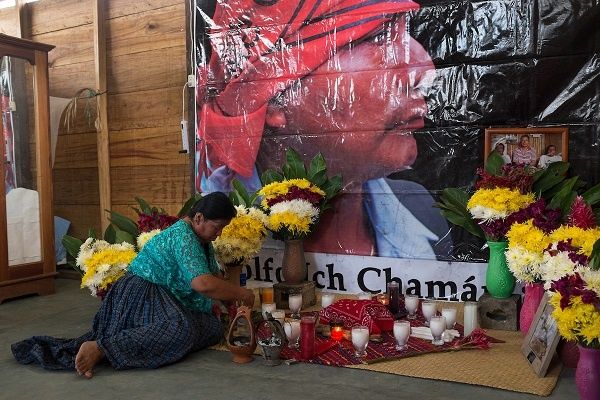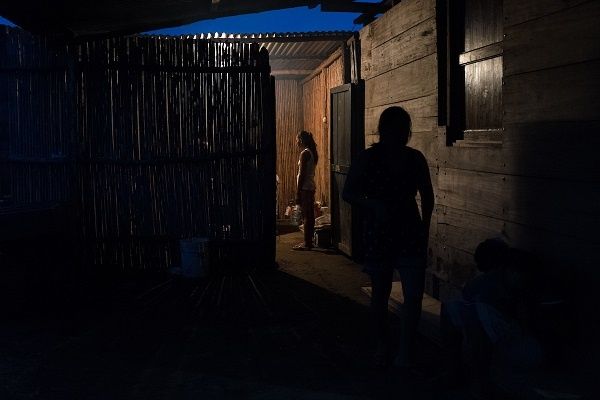It has been seven years since Hudbay Minerals security guards singled out and murdered Mayan Q’eqchi’ community leader Adolfo Ich, and shot and paralyzed German Chub, a local campesino, on September 27, 2009, in El Estor, Izabal, Guatemala, near Hudbay’s then-owned “Fenix” nickel mine.
RELATED:
Illegal Arrest of Guatemala Indigenous Authority Sparks Outrage
It has been seven years since Angelica Adolfo Ich’s widow—has been at the forefront of the risky and dignified work and struggle for justice for these mining-related crimes.
It has been seven years, and still no justice has been achieved in the criminal trial against Mynor Padilla (former Hudbay head of security and former colonel in the Guatemalan army) for the murder of Adolfo and aggravated assault against German.
It has been seven years, and still no justice has been achieved in the precedent-setting civil lawsuits in Canadian courts against Hudbay Minerals and the Guatemalan Nickel Company (CGN, its formerly owned subsidiary), for negligence causing the death of Adolfo, the shooting of German, and the gang rape of 11 Mayan Q’eqchi’ women as part of an illegal, violent community eviction in 2007.
Yet, even though the criminal trial and civil lawsuits advance at a snail’s pace in the Guatemalan and Canadian court systems, slowed down and dragged out by Hudbay’s well-financed team of lawyers in Canada and by the defense lawyers in Guatemala, likely paid for by Hudbay as well, the very fact that Angelica Choc is still leading efforts for justice is seen as a threat to the powerful mining interests in Guatemala and Canada.
RELATED:
Guatemala Sex Slave Victims Seek $3 Million in Damages
On September 17, 2016, just after midnight, unidentified men opened fire on Angelica Choc’s small, cinder block home in El Estor as she slept inside with two young children. Bullet marks were found the next morning on the walls of her house, and 12-gauge shotgun and 22-calibre bullet casings were found nearby.
While no one was hurt physically, a clear message was sent. There is little doubt this attack was carried out by people linked to the criminal trial in Guatemala and possibly the civil lawsuits in Canada. “The fact that Angelica’s house was shot at just before the Guatemalan criminal court is to decide whether the former head of mine security is criminally responsible for the brutal killing of her husband is no coincidence,” said Murray Klippenstein, one of Angelica Choc’s Canadian lawyers. “It is meant as a signal to all involved, including the judge who must decide whether Mr. Padilla is guilty.”
“I am very concerned that Hudbay’s continued irresponsible defence of both the civil lawsuits in Canada and the criminal prosecution in Guatemala have done nothing to dissuade this kind of attack in Guatemala against our clients, and in fact their failure to own up to what happened in the past and take steps to punish those responsible make it more likely this will happen again, but maybe much worse,” said Mr. Klippenstein.
On Sept. 27, 2016, close friends and relatives of Angelica Choc gathered in a ceremony to commemorate the life of Adolfo Ich and to gather strength from the elements of Mother Earth and from their ancestors to continue their struggle for justice and the defense of their territory.

Angelica Choc prays at an altar set up the morning before the seventh anniversary of the murder of her husband and former Q'eqchi' Mayan community leader, teacher and anti-mining activist Adolfo Ich Chaman.

Marcos Sam, Q'eqchi' Mayan community member from El Estor, removes corn kernels to be cooked during the seventh-anniversary commemorations for the murder Adolfo Ich Chaman.

Two relatives of the Ich Choc family help pluck the feathers from ducks to be cooked during the commemorations.

Jose Ich Choc points at bullet marks left on the wall from the Sept. 17, 2016, shooting against his mother's home. Joseph Ich is the son of Angelica Choc and Adolfo Ich Chaman.

Friends and family of the Ich Choc family gradually gather at Angelica’s home to participate in the commemorations of Adolfo Ich.

Lucy Estela Cux Maquín, granddaughter of the renowned indigenous land rights activist Adelina Caal, or Mamá Maquín, who was murdered during the 1978 Panzos Massacre, helps serve coffee to the guests.

Two young men fish in Lake Izabal near the Fenix nickel mining project. Established in 1965 as the EXMIBAL mine owned by Canadian mining firm INCO, the project was transferred to the Guatemalan Nickel Company (CGN) in 2005 after the expiration of the original 40-year license. CGN was the local subsidiary of Canadian Skye Resources, a junior mining company comprised of former INCO directors, until Canadian HudBay Minerals acquired Skye Resources in 2008. Russian-based Solway Group bought the mine in 2011. The Fenix project, marred with numerous human rights issues throughout its history, began formal processing operations in May 2014.

German Chub Choc rolls up to his own home from his sister's house next door. On September 27, 2009, Mynor Padilla, former head of security for the Guatemalan Nickel Company, shot German during the melee where Adolfo Ich was murdered. After nearly losing his life, German recovered but now suffers from paraplegia and numerous ailments related to the shooting.


Local Q'eqchi' Mayan elders carry out a Mayan spiritual ceremony the evening of the seventh anniversary of the murder of Adolfo Ich inside Angelica Choc’s home.

Angelica Choc speaks to those gathered: “Obviously I am going to continue with the criminal trial in Guatemala against Mynor Padilla, the former head of security for Hudbay Minerals, for the assassination of my husband, and the attack that left German Chub paralyzed. Obviously, I am going to continue with our civil lawsuits in Canada for these same acts of repression, as well as the rapes of the 11 women from Lote 8. But yes, for sure, I am now more afraid due to the attack on my home—I am more afraid for myself but particularly for my family—they directly attacked me and my family. This is very difficult.”

Grahame Russell is a non-practicing Canadian lawyer, author, adjunct professor at the University of Northern British Columbia and, since 1995, director of Rights Action (www.rightsaction.org).
James Rodríguez is a U.S.-Mexican documentary photographer based in Guatemala focusing on human rights issues, post-war processes and land tenure conflicts due to the presence of extractive industries (www.mimundo.org).